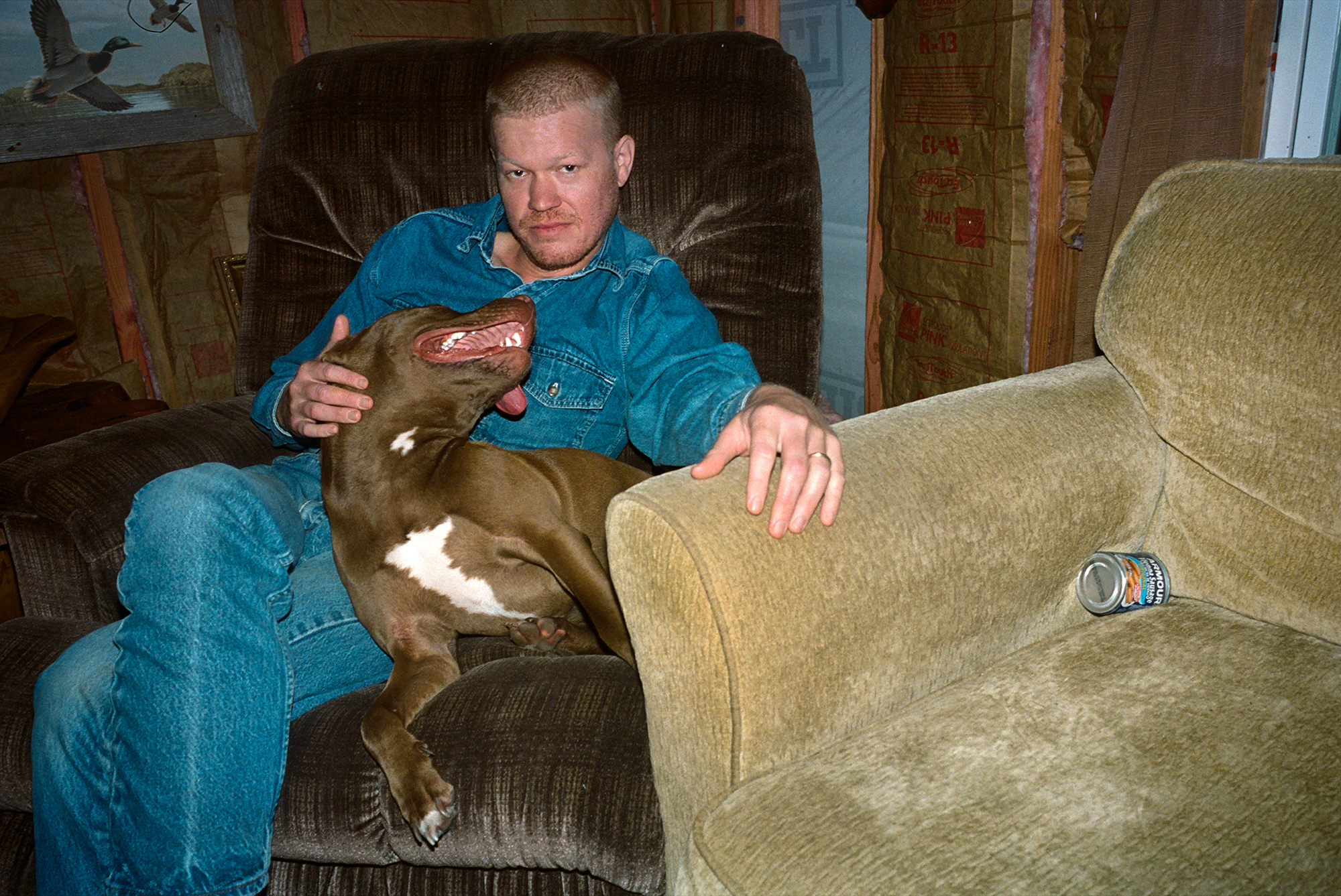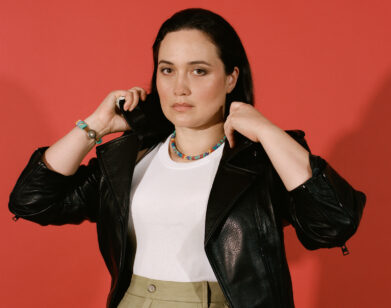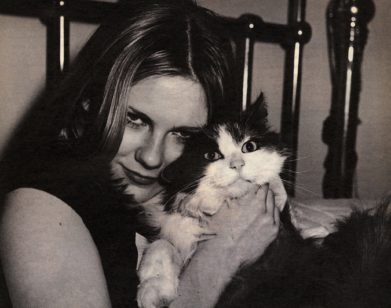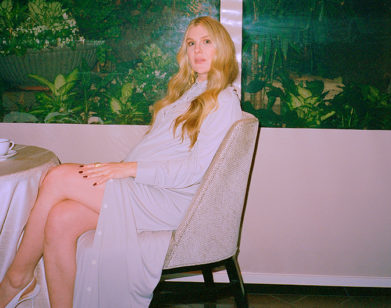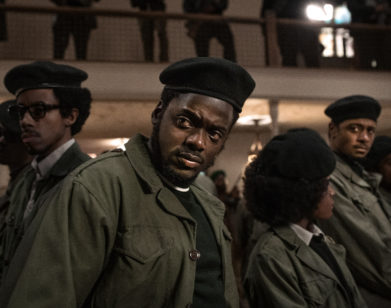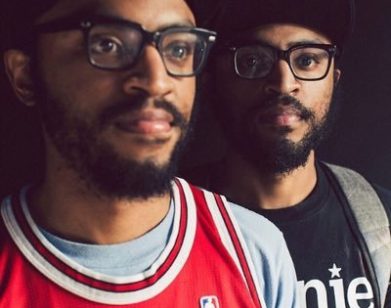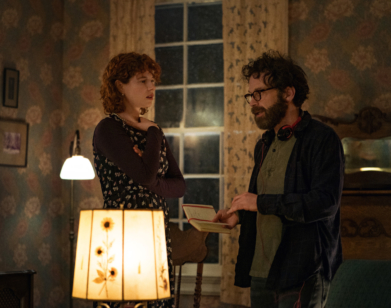ACTORS
Jesse Plemons and Daniel Kaluuya Are Keeping Themselves in Check
MONDAY 1:45 PM DEC. 20, 2022 LA
Jesse Plemons is in Los Angeles, waiting to be joined by Judas and the Black Messiah costar Daniel Kaluuya. He just got back from New Orleans, where paparazzi snapped him with Emma Stone on the set of Yorgos Lanthimos’s mysterious new movie, and if the rumors are true will soon be flying to Cannes for the world premiere of Martin Scorsese’s true-crime thriller Killers of the Flower Moon. When Daniel finally joins him to discuss Jesse’s new HBO Max drama Love & Death, he’s shocked to see how much weight his friend has lost.
———
DANIEL KALUUYA: Whoa! What is going on, bro?
JESSE PLEMONS: I don’t know, man. Something clicked in my head and I got tired of carrying all that extra weight around.
KALUUYA: How did you do it?
PLEMONS: I got asked to do a scene in this movie and I was playing a soldier, and I was like, “I don’t know many soldiers that are my size.” So like everyone else, I started doing intermittent fasting, cut carbs, all that stuff. It’s easy if you just actually do it.
KALUUYA: You just got to commit.
PLEMONS: Yeah, it’s not that complicated.
KALUUYA: The secret to losing weight is that you’ve got to train more than you eat. I’m happy for you.
PLEMONS: Thank you, man. I feel better. Blood pressure’s down. I got two kids, and they’re getting to the point where I have to keep up with them. How are you doing, man? Where are you?
KALUUYA: I’m in L.A., just chilling, bro.
PLEMONS: Are you here for the holidays?
KALUUYA: Yeah. My family came through, got my niece running around while I was trying to watch your show.
PLEMONS: Thanks for doing this. Sorry you had homework to do.
KALUUYA: Brother, I fuck with you. You know that. I’m a fan, so it’s a pleasure to do it. So how we doing this? Free-flow?
PLEMONS: We just jump in.
KALUUYA: Yeah, let’s have a nice one. The first thing I wanted to ask is, you always keep coming back to episodic storytelling, you know what I’m saying? Telly. Is that intentional, or is it more character-led or process-led? Is it story-led? Is it the money? [Laughs]
PLEMONS: I think I’ve just been really, really lucky to sneak into some great limited series. And my first real gig where it hit me that I might be able to do this for a living was this show called Friday Night Lights.
KALUUYA: I love that show.
PLEMONS: It was the first time I felt like I got to grow up with a character. There’s something unique to TV where you have more time, and you don’t always know what’s coming. But beyond that, I don’t have any set rules. Sometimes it’s the part, sometimes it’s the people, sometimes it’s the story, but I try not to zoom out too big and think of what I will or won’t do.
KALUUYA: Speaking on that, what is it about this character in Love & Death that drew you in?
PLEMONS: There were a few things, but what was immediately interesting to me was that I grew up maybe an hour and a half south of where this story took place, so there’s something that I inherently understand, in terms of religious oppression and suppressing basic human desires and all the guilt and shame that a lot of these characters carry around. There’s also this dynamic between Candy and Allan that feels like a high school romance. It’s really awkward and clunky and dangerous. The stakes for them are extremely high in terms of judgment from god, and in terms of cheating on their spouses. And I liked the fact that it’s a true story, which is pretty mind-blowing considering how strange it is. There was a Coen brothers–esque Middle America weirdness to the whole thing.
KALUUYA: I’d love to speak more about that, because when I was watching it, I was like, “What is making this so compelling? It’s their belief systems and them actually betraying that in order to be human.” The elephant in the room is god.
PLEMONS: Yes.
KALUUYA: That was fascinating. What is your relationship with religion and god?
PLEMONS: I have to think about who in my family’s going to be reading this. [Laughs] I will say I grew up in a tiny town. My parents sort of chose the town because of the church. I later realized my parents weren’t extremely religious, it was just what you do. It was kind of a given. I also realized when I got older that I was the only one that was paying attention in church. My sister was off in her own world, and I think even for my parents it was just a ritual. They weren’t taking it as intensely as I was. When I was older, I started to realize that there was a lot of it that didn’t make sense to me, but especially in those formative years, it felt like there was this looming figure that’s always watching you. It’s something I’ve worked through, but I’m probably still carrying around to a degree. But I understand that feeling of the lines being very hard: good, bad, heaven, hell. And to see it in someone at his age—I went through all of that when I was much younger—it felt like a way to explore the effect that that can have. But if I learned anything, I don’t know what it is yet.
KALUUYA: How was it playing a real-life guy? How much did you engage with the reality of the situation?
PLEMONS: That’s always the tricky part, and he’s still alive. We had this book that was really helpful that went into their backgrounds and all that. Both Allan and Candy were not interested in being involved. Early on, we’re all sort of trying to figure out what the tone of this would be, and Lesli [Linka Glatter, the director of Love & Death] referenced this movie called To Die For. Have you ever seen it? It’s Gus Van Sant, Nicole Kidman, Matt Dillon. It’s a very, very strange movie.
KALUUYA: Quite a list.
PLEMONS: Something clicked after I watched that. You’re obviously trying to ground it and make it as truthful as you can, but you have to remind yourself that you’re making a show, not a documentary.
KALUUYA: When you watched To Die For, what clicked specifically?
PLEMONS: There were a lot of different acting styles in this one movie. It shouldn’t work, but it does. The tone is so hard to articulate. It’s grounded, but there’s a playfulness. It’s just a very strange movie, really funny, and then takes really dramatic turns. And it was hard to have a reference for the crazy arc that our story takes, from awkward Southern, church-going humor into this crazy murder.
KALUUYA: Did you feel any responsibilities by depicting crime and rural people? What kind of baggage did you feel on set and how did you work your way through that?
PLEMONS: One of the many conversations we had with Lesli was, yes, on the surface this is a dark comedy, but that doesn’t really get can tragedy, and finding the antagonist in it is really difficult. There’s not a bad guy in this that you can point to. We obviously know the events that led to this murder, but you can see clearly why these people made these decisions, and there’s something so tragic about it. Once we got into that, there was a very tangible shift in atmosphere on the set. It got really, really heavy.
KALUUYA: What do you think this says about the American dream?
PLEMONS: That’s a good question. I don’t know, man. What do you think it says
about the American dream?
KALUUYA: What’s that George Carlin quote? It’s called the American dream because you have to be asleep to believe it.
PLEMONS: Yeah.
KALUUYA: So yeah, I’ve got to talk about it, bro. You work with Martin Scorsese. That’s legendary business. What can you say about Killers of the Flower Moon3, and how does working with him challenge you?
PLEMONS: The first time I worked with him [on The Irishman], it was a very specific role and function that I was playing. The only way I knew how to describe it was I felt like the kicker at the Super Bowl. It was just like, I know what I have to do. Again, he was a real person that I was playing, and there’s a lot of fascinating information that I read about this guy that doesn’t fit into a three–hour–plus movie. So it was like, “Focus, don’t get too excited and try to do too much.” And then with Killers of the Flower Moon, I had more time there. I read the book and was kind of living with it for a year or so, not knowing what part I was going to be. And when I found out it was Tom White 4, it felt like every sort of Christmas holiday rolled into one. The guy, at least the way he comes across in the book and in reading about him, he’s a superhero of morality. The guy is just a fucking beacon of justice. Obviously, he had his flaws like everyone, but I had built this character up so massively. And the story as well is—it’s mind-blowing that more people weren’t aware of it until this book came out. We were shooting in the location where all this happened. A lot of the Natives that were in the film were descendants of the people that were affected or murdered. So I’ve never felt the weight of a real story, of real people, like this. As for working with Scorsese, he really gives you a lot of space, likes playing around, and is open to any ideas. He’s got an infectious excitement, even after all this time. It just seems like he can’t believe that this is what he gets to do with his life.
KALUUYA: I can’t wait to watch that, man. We’re both in a really blessed position where we can kind of pick what we want to do. It’s great, but you have to learn a new skill set, in terms of, “What do I want to do as opposed to what’s good for me?” As your career grows, how much responsibility do you feel when you’re picking the stories you’re telling, in terms of their importance and meaning? Is that front of mind? What’s the value list?
PLEMONS: I have a sort of checklist and all that, but I can start to get overwhelmed with the number of doors I can enter in this line of work. So what I’ve found most successful for me is that for each thing that comes my way, there’s a feeling. I’m always looking for something that’s going to push me, something I haven’t done before, and something that’s exposing something that feels like life. I’m excited to get into developing, and Kirsten [Dunst, Plemons’s wife] and I have such an easy way of working together that there’s really good checks and balances there. I’d love to develop more with her because there’s no ego whatsoever. What about you? Is it something that you’re like, “Alright, right now, this is what I’m looking for.”
KALUUYA: Sometimes it is. I used to be like that: “Check, check, check.” I realized it was too controlling and I didn’t really enjoy the fruits of that. Right now, I’m in a place where I really want to articulate joy. Do you know what I’m saying? That’s one of the biggest challenges in cinema, actually capturing joy. Because I think Fast & Furious is fucking joyful as fuck.
PLEMONS: Yeah. Joyful, with hopefully some substance.
KALUUYA: Exactly. Because that’s the thing, a lot of joy is shallow. How do you create joy with depth? That for me is fascinating.
PLEMONS: But then there’s Nope. That was the first time in a while I’d gone to the theater and it achieved that sort of spectacular moviegoing experience, with world-building while being fully immersive and something you haven’t seen before. So you are doing it.
KALUUYA: That’s old-school Spielberg shit. Jordan [Peele] went crazy on that. That stuff makes me happy, when you’re rooting for someone and you’re out of your seat. That’s the cinema that I felt I really fell in love with, if I’m being honest. I love an art house film any day of the week, but them big popcorn moments when it’s with a communal group of people and everybody’s like, “Come on!” That’s how I felt when I watched the film Warrior with Tom Hardy and Joel Edgerton.
PLEMONS: Oh yeah.
KALUUYA: Oh man, that fight. I was out of my seat. I feel like people don’t prioritize that anymore. Okay, my last question. How are you?
PLEMONS: Aw man. Thank you for that. I feel so incredibly fortunate. I just wrapped something that was so strange and creatively fulfilling and now I’m back with my wife, two boys, I got my family flying in for Christmas. I’m still kind of pinching myself that this is my life. How are you?
KALUUYA: I think I’m better. I’m good. I’m actually good. It was a bit hairy. That Oscar shit is no joke.
PLEMONS: I know, man.
KALUUYA: It’s kind of a mad thing. It means a lot to a lot of people, so you’re kind of in the middle of a tornado, in terms of perception, and then you meet your version of that and go, “Am I supposed to be like this?” I think I’ve only now come to, “Oh, I’m just going to be me, fuck it.”
PLEMONS: If you allow yourself to think about it, there’s too many doors to go into.
KALUUYA: Yeah. And it’s like no matter how sane or real you are, or how good of a support network you got, your ego’s going to get swollen.
PLEMONS: Yeah.
KALUUYA: It just is. So after something like that, I feel cool now. It’s been really good to be myself and not give that much of a shit what other people think about me.
PLEMONS: That’s the challenge. I have to pay you one compliment before we end. Talking about acting with you is much easier than with the typical press, where I find myself so annoyed at the words coming out of my mouth, when I’m trying to articulate what it is, or I’m like, “Oh my god, that’s pretentious.” But you have this way of speaking about acting that is so unpretentious and it doesn’t feel self-involved.
KALUUYA: Thanks, man. One of my favorite actors, a guy called Johnny Harris who I did a TV show within 2011—I was really intimidated by him but he was so warm at the same time. I realized, “Oh, you don’t have to be miserable to be serious.”
PLEMONS: Totally.
KALUUYA: That’s what I hold onto. This is what I do and I give a fuck, but this is it, innit? I’m not curing cancer, but I take it seriously. Let’s have fun with it.
PLEMONS: Yeah. Well thank you for doing this, man.
KALUUYA: Been a pleasure. I’m happy you’re looking healthy, bro. You’re looking strong in these streets. How old are your kids?
PLEMONS: Four and a half and one and a half.
KALUUYA: Jesus. Yeah, you got to be fit. I will say this just to close. Your performance as always is just subtly incredible. I love watching you grow as a performer and as a man on-screen. Trust me, you’re one of the ones, my guy.
— — —
- Love & Death tells the true story of Candy Montgomery (Elizabeth Olsen), who murdered her friend Betty Gore after having an affair with her husband Allan, played by Plemons.
- The story takes place in Wylie, Texas.
- The Martin Scorsese–directed movie follows the F.B.I. investigation into the murders of members of the Osage tribe in 1920s Oklahoma.
- The lead agent in the investigation. The part was originally meant for Leonardo DiCaprio, who moved to a supporting role.
— — —
Groomer: Eva Lohse.

